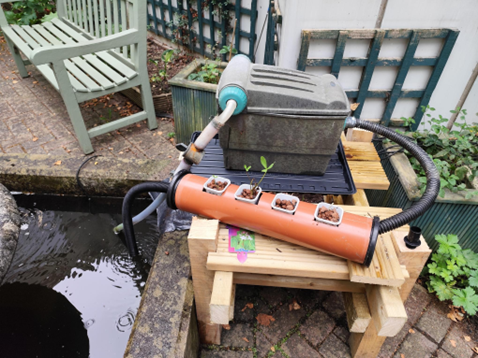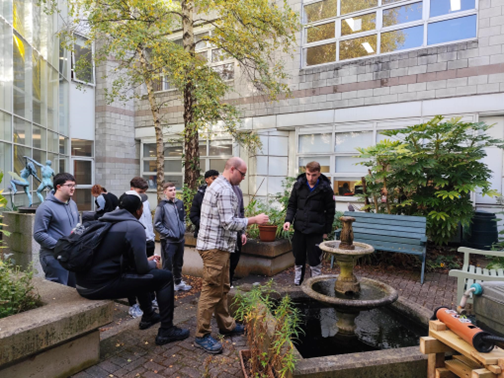The Living Lab Garden Space

Authors: Linda Bennett, Niamh Plunkett, Gerard Ryder
Nurturing Nature: Roots of an Idea
There is a growing realisation that spending time in nature is good for our mental health [1]. Yet how many of us are really aware of just how our busy lives impact our environment? Staff from TU Dublin are developing a holistic living lab concept in one of the courtyard gardens on the Tallaght campus. There are two interlinked elements to the idea of a holistic living lab: encouraging staff and students to spend more time in the campus gardens, and teaching them a wider appreciation of how our lives impact on nature using data and physical evidence and a range of simple open-source sensor systems and lab equipment that will allow them to see nature from a different perspective.
At the foundation of the Tallaght campus in 1992 John Heaney, Campus and Estates, worked on the development of the garden space with funding provided by Paul Caffrey. The aim of this initial project was to develop a space where students and staff could relax. More recently, staff from the Library, including Linda Bennett, started work on a sustainable sensory space within the courtyard garden adjacent to the Library. The goal of the Library project is to encourage students and staff to see the garden as a space that they could use, sit in, to contemplate and relax surrounded by birds, flowers, and plants donated by staff.
Staff from the Library presented some of the initial work in the garden at the CONUL Conference 2023 and were able to give delegates sunflower seeds grown in the garden. Improvements made as part of the project included increasing the number of bird feeders, nesting boxes, and installing insect hotels made from recycled plastic bottles and organic material from the garden.
Branching Out: Building a Living Lab Concept
Work funded by the N-TUTORR project is also supporting the development of work to map the water quality of the Poddle river that runs through the Tallaght Campus. Gerry Stockil has purchased a range of water quality sensors that are used by students to measure water quality in the Poddle river adjacent to the college. These sensors are also being used by Martha Burton with second year students on the BEng Sustainable Energy programme. Student projects supervised by John Fox, Andrew Donnellan and Thomas Murray from Electronic Engineering have focused on the development of air quality and water quality measurements systems linked by a LoraWAN network. Following on from these projects and the Sustainable Sensory Garden project run by the Library, Gerard Ryder and Niamh Plunkett are developing a garden-based living lab concept as a natural evolution of these ideas. From the TU Dublin website:
“Living Labs are open innovation ecosystems set within real-life environments and are based on a user co-creation methodology that integrates research and innovation activities in communities, placing citizens at the centre of innovation” [2].
The aim of this particular living lab project is to develop a range of sensors and develop units of learning for our first-year students around three key concepts: Air Quality, Water Quality and Soil Health. The focus in on getting students to measure basic parameters in the garden using a range of open-source sensors and 3D printed lab equipment, develop their ability to analyse environmental data, and see for themselves how their lives impact the natural environment. The project will also allow us to develop a better understanding of the biodiversity across all TU Dublin campus sites and link this to national biodiversity priorities [3].
Growing Student Awareness of the Environment
The first activity for students on the BEng (Hons) in Sustainable Energy programme is focused on water quality. Water is essential to all life on our planet and yet our society takes it for granted. A vast quantity of human and animal manure, fertilizers and industrial chemicals are washed into our rivers, lakes and seas every year. The Environmental Protection Agency (EPA) monitors water quality across Ireland. In a recent study the EPA identified that 42% of rivers, 20% of groundwater and 17% of Estuarine and coastal water areas of Ireland have Nitrate level higher than recommended limits [4].
Citizen science is another important part of tracking water quality. To track water quality communities need access to easy-to-use sensors that give quick feedback on water health. These sensors will be built and calibrated by the students during their studies and used to track water quality in the pond garden. One of the first experiments to go into the garden was suggested by first year students on the BEng Sustainable Energy programme in 2023. The pond in the courtyard garden has been suffering from its own pollutions problem. The pond has a number of beautiful koi carp, Zipper, Skipper and Dave. However, the fish's natural growth cycle results in waste that breaks down in the water to produce excess nitrates. This has resulted in the overgrowth of algae in the pond that is periodically cleaned out by staff within the college. The students recommended the use of pond plants to control nitrate levels in the water. The pipe that has been added to the existing filter is a living filter that combines porous clay media that allow bacteria to thrive and clean the water biologically. Embedded in the clay media are a series of pots that contain 2 wild plants: Water Mint (Mentha Aquatica) and Bog Bean (Menyanthes Trifolata) both wild water plants native to Ireland. As these grow and their roots spread through the porous media they will consume the excess nitrates in the water and increase the filter efficiency. This type of system is called a Living Machine [5].
During their Critical Skills Development module students will get to monitor the environment within the garden and then develop projects to enhance the biodiversity within the garden.

Figure 2: The living filter in the Courtyard Garden on the TU Dublin, Tallaght Campus.

Figure 3: Students from the Critical Skills Development module in first year of the BEng (Hons) Sustainable Energy Programme delivered on the TU Dublin, Tallaght Campus.
Cultivating connections
A symbiotic relationship is being cultivated between students, Library staff and teaching staff in the college. As students complete their projects the Library is on hand to support their information needs. The Library staff have the added benefit of seeing the results directly outside their window.
This work is supported by the Digital Education and Sustainability project funding provided by the National Forum for Teaching & Learning SATLE Fund.
The partners in this project are actively looking for members who can complement our knowledge in the areas of the ecology, environment, climate change, biodiversity, horticulture, anyone who would like to get involved expanding this idea across all TU Dublin sites. We are also looking for funding opportunities to support the expansion of this initiative and further development of the other courtyard garden spaces. If you would like to get involved or can help in any way please get in touch with Gerard Ryder.
Credits
Linda Bennet Senior Library Assistant, Teaching & Learning coordinator
Martha Burton Lecturer in Mechanical and Energy Engineering
Andrew Donnellan, Lecturer, Electronic Engineering
John Fox Technical Officer, Electronic Engineering
John Heaney, Operations and Services, Estates Supervisor
Tom Murray, Lecturer, Electronic Engineering
Niamh Plunkett, Lecturer in Mechanical and Energy Engineering
Gerard Ryder, Lecturer in Mechanical and Energy Engineering
Gerry Stockill, Lecturer Electronic Engineering
Students Currently working on the Living Lab concept
First Year students on the BEng (Hons) Sustainable Energy Engineering (TU801)
Second year students on BEng (Hons) Sustainable Energy Engineering (TU801)
Third year Sustainable BEng (Hons) Energy Students (L7 Project)
Fourth Year Sustainable BEng (Hons) Energy Students (L8 Project)
References
[1] Catherine Cleary, Nature therapy: How to get your ‘daily dose of trees’ to boost body and mind, The Irish Times, Jan 13th 2024
[2] Living Labs
[3] National Biodiversity Data Centre Strategic Plan 2024-2028
[4] Environmental Protection Agency (EPA) Water Quality in 2023: An Indicators Report
[5] Tafline Layline, The Living Machine: an ecological approach to poo, The Ecologist, 8th June 2010.
